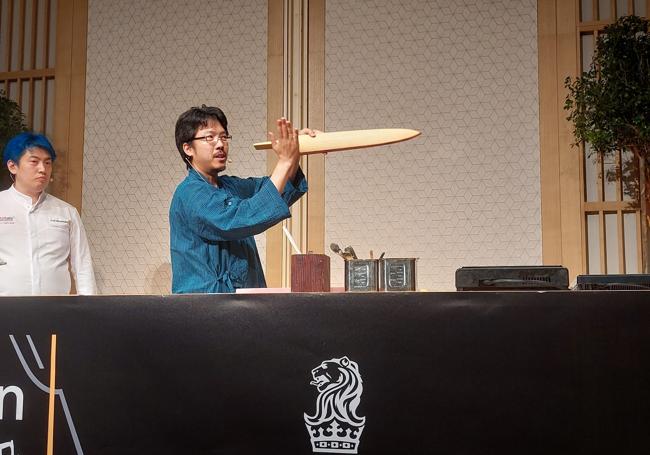Sábado, 24 de mayo 2025, 00:50
The Ritz Carlton Kyoto, one of the most beautiful and emblematic hotels in the historic capital of imperial Japan, hosted the international version of the world’s most important gastronomic congress for two days, Madrid Fusion Atelier Kyoto, organized by Vocento Gastronomy and Foods of Spain with the collaboration of Aquanaria and Catalonia World Region of Gastronomy 2025. Two intense days where some of the best chefs from both countries, along with artisans, gastronomy experts, and scientists, showcased their concerns and initiatives to improve the relationship with the sea and the utilization of its resources.
The Minister of Agriculture, Livestock, Fisheries, and Food, Luis Planas, who presided over the inauguration, stated that “Spain and Japan share, among other things, a cultural affinity beyond formal differences, and this connection is a starting point for Japan to appreciate the quality of Spanish foods. That’s what Madrid Fusion Kyoto does.” The cultural affinity, or at least sensitivity, was evident in the presentations by Japanese chefs Yoshihiro Narisawa (Narisawa*, Tokyo) and Katsuhito Inoue (Chef’s Table, Kyoto), both inspired by nature and landscape, and their similarities with Javier Olleros (Culler de Pau*, O Grove), whose cuisine is a tribute to the Galician estuaries and their gardens.

Ricard Camarena (Ricard Camarena Restaurant*, Valencia) made a plea in his speech about using cuisine to elevate less valued products. “It’s all a matter of perspective, and we need to change our viewpoint,” he said. A message echoed by Tomoharu Murata (Kikunoi** Restaurant, Kyoto), who advocated for seaweed cuisine. “Since 1994, we Japanese have halved our seaweed consumption. We are forgetting a great source of protein just as we are about to face its scarcity. We need to ally with producers and scientists and show people how much they offer us,” Murata argued.
On the scientific side, oceanographer Atsushi Watanabe, a researcher at the Sasakawa Peace Foundation, analyzed the history and future of seaweed aquaculture, highlighting its importance in combating climate change due to its carbon absorption capacity. He noted that while Japan is reducing its seaweed production, Spain has risen to sixth place globally in marine vegetable exports.
Maintaining Biodiversity
Geneticist Takashi Gojobori, director of the Marine Open Innovation Institute (MaOI), spoke about the importance of maintaining biodiversity and how his team’s studies on the genome of marine species aim to help prevent potential problems threatening the survival of various species. The astonishing biodiversity of the Philippine Sea was the setting for the restless Cantabrian chef Chele González, a pioneer of high Filipino cuisine with local products. “I traded the cold waters of the Atlantic for the warmth of the Pacific and discovered species that opened my eyes as a chef,” he explained. Something similar happened to Luca Fantin (Bulgari, Tokyo), an Italian chef who left the Mediterranean coast for the waters of Japan.
All the presentations were of extraordinary quality, but for its originality, the one offered by chef Koji Minemura of AO Restaurant in Tokyo, with Masashi Fujiwara, one of Japan’s most famous knife sharpeners, Hiroki Hasegawa, a fishmonger, and fisherman Junichi Fujimoto, was impressive. Three stellar artisans in their respective fields who changed the way the young chef thought and cooked. “I discovered that everything influences the taste of dishes, even the water you use to boil seafood and, of course, the way you fish and handle fish and the sharpening of knives. We all think it’s obvious that a good wine needs an appropriate glass. Well, in food, it’s possible to enhance the aromas of ingredients with the cut of a knife,” he said.


Few chefs have done as much to find connections between Japanese and Spanish cuisines as Albert Raurich, whose restaurant Dos Palillos (** Barcelona) is, according to his former mentor Ferran Adrià, “the best Asian restaurant outside Asia.” Accompanied by his wife and sommelier, Tamae Imachi, each explained how, with a broad perspective, connections can be found in the seemingly most distant things. Raurich was also the ambassador at Madrid Fusion Atelier Kyoto for ‘Catalonia, World Region of Gastronomy 2025’, and gave a second presentation about his native cuisine, which he researches and develops at his restaurant Dos Pebrots.


At an event about Spanish gastronomy in Japan, wine and olive oil could not be missing, presented to a curious and dedicated audience by two accomplished specialists: Master of Wine Fernando Mora and international olive oil taster Alfonso Fernández. An opportunity to explain that both Spanish wines and oils contain an astonishing diversity and an irreversible path towards excellence.
At the closing of the congress, the director of the Ritz Carlton Kyoto said: “We look forward to seeing you in 2026 for the third edition.” Judging by the reception from the Japanese gastronomy sector, including distributors and restaurateurs who attended the sessions and gastronomic dinners with the lineup of chefs, it can be said that Madrid Fusion is taking root in Japan.
Comenta
Reporta un error


AloJapan.com